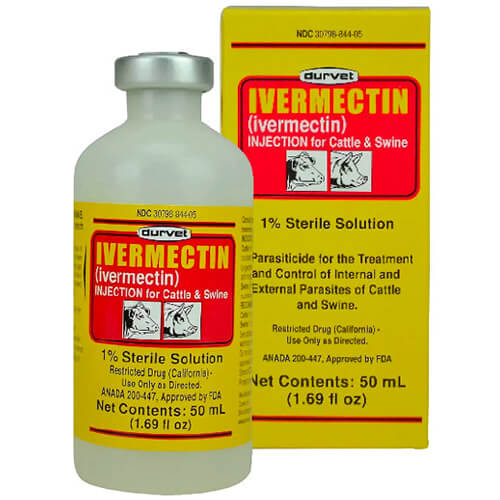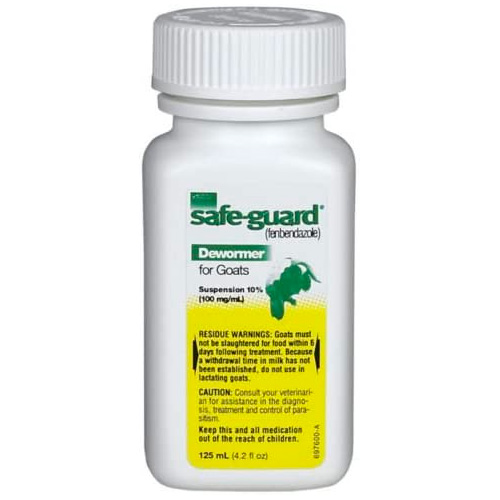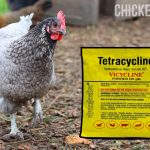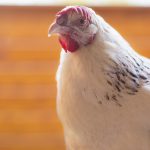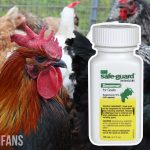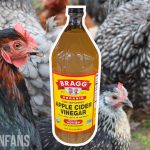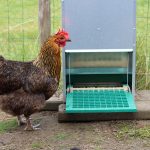Worms in Chickens: How to Identify, Treat & Prevent Worms (2024)
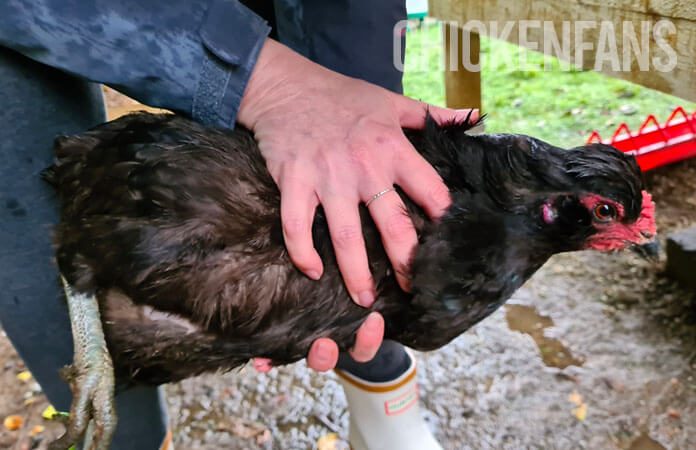

Chicken Fans is reader-supported. When you buy through our links, we may earn a commission. Learn more about our privacy policy and disclaimer.
RISKS | TRANSMISSION | WORM TYPES | SYMPTOMS | TREATMENT | PREVENTION
Worms in chickens are a pesky problem for backyard chicken keepers and poultry farmers worldwide. They can have a devastating effect on the chicken’s health, weight, and egg production. Poultry worms can even cause death in severe cases.
Unfortunately, the majority of chickens in backyard poultry flocks have intestinal parasites.
Several types of worms can infect chickens, including roundworms, tapeworms, and gapeworms. These are entirely different creatures that cause their own set of health issues. For example, roundworms can cause diarrhea, while gapeworms provoke respiratory issues.
If you’re looking for a quick solution for wormy chickens, here are our recommendations for dewormers.
- Ivermectin: Pour on 0.2mg-0.4mg/kg of bodyweight (at maximum of 0.5mg/kg). Spread the feathers on the neck and apply the drops immediately on the skin of the chicken. Repeat after 7-10 days to kill larvae that hatched in the meantime. For full instructions on Ivermectin, check our guide on Ivermectin.
- Safe-guard: Add 1 mg/kg fenbendazole in drinking water for the subsequent 5 days. Repeat the treatment after 7 days.
- Apple Cider Vinegar: add 1 or 2 tablespoons per gallon of water
- Pumpkin Seeds: Add 2% of pumpkin seeds to the chicken’s diet or 2 g/bird per day.
There are various options to treat worms, including medication and natural remedies. However, prevention is key when it comes to worms in chickens. We’ll go in-depth on the several types of worms and how to identify and eliminate them.
How Dangerous Is a Worm Infestation for Chickens?
Internal parasites (worms) are widespread in chickens. Having few parasites usually doesn’t cause big problems, but they can quickly become a major concern. Heavy worm infestations negatively affect a chicken’s overall growth, general health, and egg production.
Regular checking and deworming with an effective dewormer improves the overall performance of your flock. How sick your chicken gets depends on the number of worms it carries. This can be measured by checking the number of parasite eggs in the chicken’s droppings.
How Do Chickens Get Worms?
The fecal-oral route is the most common way of transmitting worms from one bird to another. Usually, chickens excrete parasite eggs in their droppings. Other birds instantly develop parasites by consuming contaminated water, food, soil, litter, or droppings.
Additionally, chickens can indirectly get worms by eating intermediary hosts like infected earthworms, bugs, snails, or other secondary hosts that spread the parasitic worms. These parasites reproduce, lay eggs within your chickens, and spread through droppings. That’s how their lifecycle continues.
7 Types of Worms in Chicken
Several types of worms can affect chickens. Large intestinal roundworms and tapeworms are the most commonly seen in poultry.
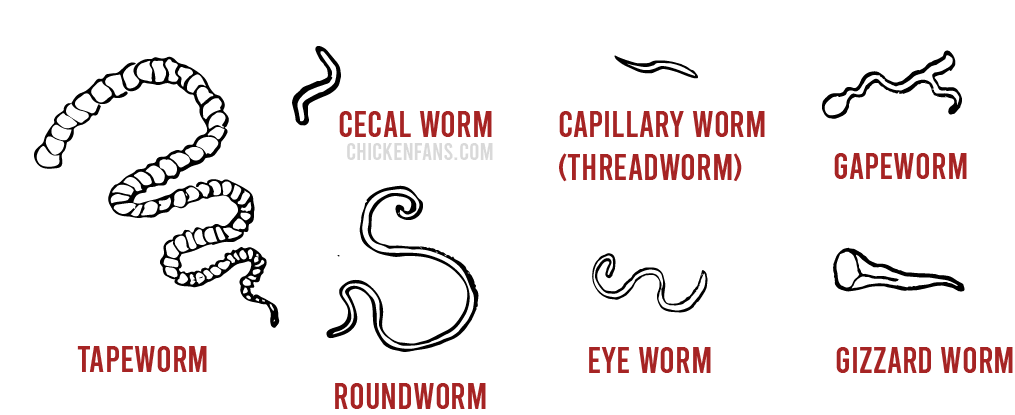
1. Large Roundworms (Ascaridia galli)
Roundworms are the most common intestinal parasite in chickens, sometimes even in commercial eggs. Female worms grow up to 3-4 inches and are visible to the naked eye. They live in the small intestine of chickens and can be seen in chicken droppings during a heavy infestation.
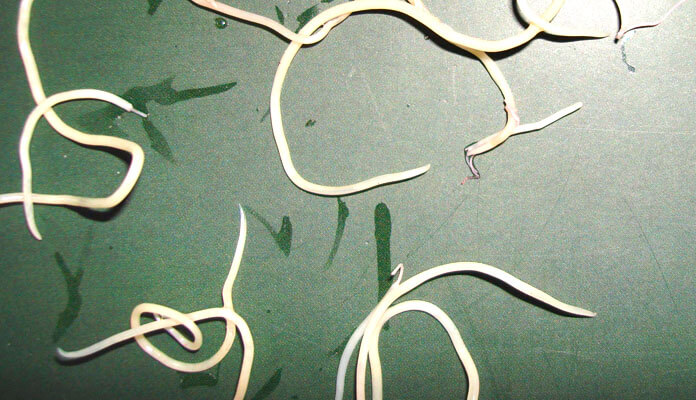
Heavy loads of roundworms sometimes block the intestine, which can ultimately result in death. They reduce the feed absorption ability of birds and are responsible for poor egg production and pale egg yolks. They can transmit from one bird to another in both direct and indirect ways.
2. Cecal Worms (Heterakis Gallinarum)
Cecal worms are common roundworms living in the intestinal ceca of chickens, often causing little to no health issues. However, the worms can carry the protozoan parasite Histomonas meleagridis, which causes blackhead disease. The infected eggs are spread through droppings ingested by earthworms.
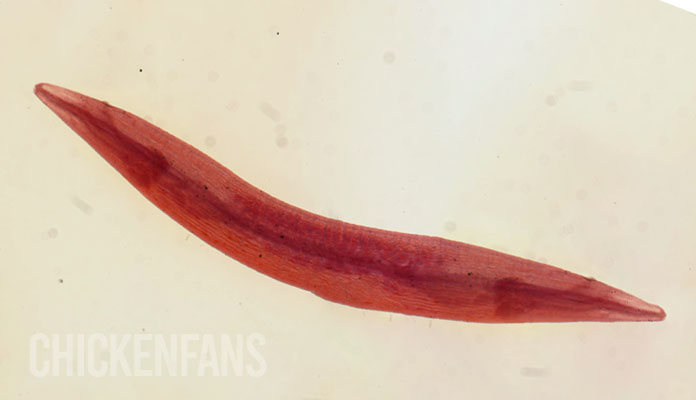
They are called cecal worms since they nestle in the cecum (plural: ceca). These are two oddly S-shaped blind-ended sacs at the end of the chicken’s large intestine. It’s where the latest parts of undigested food ferment in the body.
The worms excrete eggs that are ingested by ground-dwelling earthworms, bugs, grasshoppers, and houseflies. Chickens and turkeys can get blackhead disease after eating infected earthworms.
Turkeys are extremely susceptible to blackhead disease, with up to 70-100% of the birds dying after infection. It’s less severe in chickens, but the disease causes poor health and reduced egg production.
3. Capillary worms (Capillaria sp.)
Capillary worms (aka hairworms, threadworms) are tiny, thread-like organisms living in a chicken’s esophagus, crop, and intestines. They are just under half an inch in size and cause diarrhea, hemorrhage, anemia, and thickening of the intestinal walls. This results in poor nutrient absorption and growth.
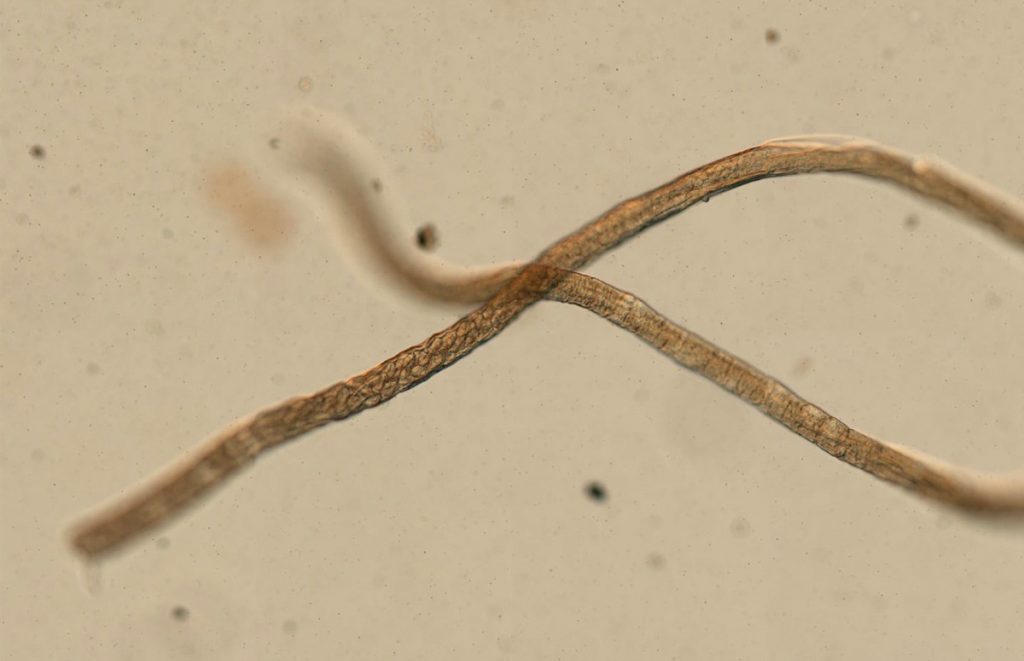
Birds affected in the oral cavity, crop, and esophagus often show signs of respiratory distress, including open-mouth breathing and gasping for air. While numerous nematodes can infect the crop, Capillaria annulata and Capillaria contorta are the most common crop worms and are frequently diagnosed in gamebirds.
Chickens get infected when they ingest parasite eggs. This can be via contaminated food, earthworms, or insects carrying the parasite.
4. Gapeworms (Syngamus trachea)
Gapeworms (aka redworms, forkedworms) are common Y-shaped parasites that live in the windpipes of chickens, where they cause breathing problems. They can reach up to 13 inches. A gapeworm infection obstructs the airway, causing chickens to stretch their neck, shake their head, open their mouth, and gasp for air.
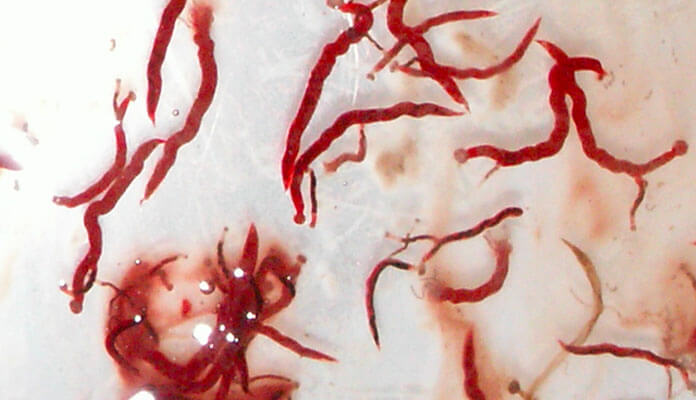
5. Gizzard worms (Amidostomum Anseris)
Gizzard worms are roundworms that live in a chicken’s gizzard, which is the muscular part of the stomach to grind food. They cause inflammation and malnutrition. Infected chickens suffer from weight loss, and hens slow down on egg-laying. Infected insects like grasshoppers and beetles can spread the worm.
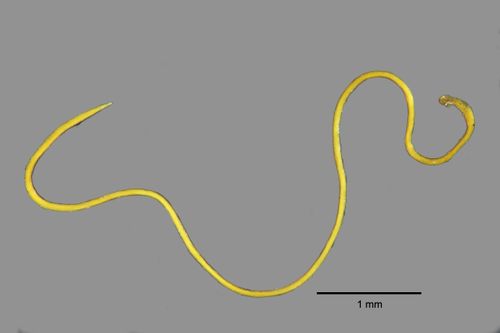
The other part of the chicken’s stomach, the proventriculus, is responsible for the chemical digestion of acids and enzymes. Although gizzard worms don’t live in the proventriculus, they can also cause inflammation and irritation in the proventriculus.
6. Tapeworms (Eucestoda)
Unlike other worms, tapeworms are flat, ribbon-like intestinal parasites of the Cestode family. They live in the intestinal tract of chickens and can easily be noticed in droppings. Tapeworms are segmented, resembling the trunk of a palm tree. The segments (proglottids) contain parasitic eggs.
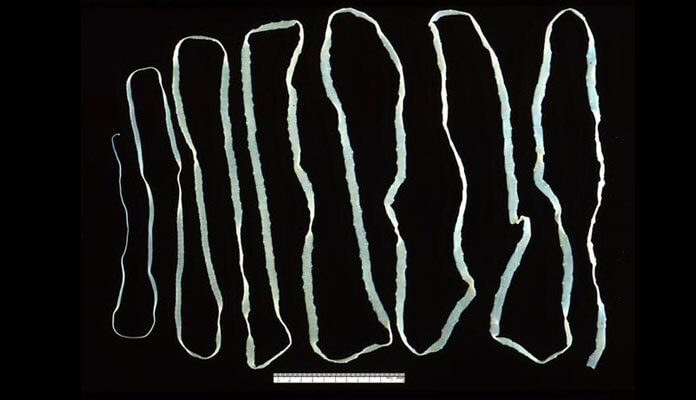
Chickens don’t always show many symptoms, but the tapeworm feeds on essential nutrients in the body, causing diarrhea and making chickens appear unthrifty.
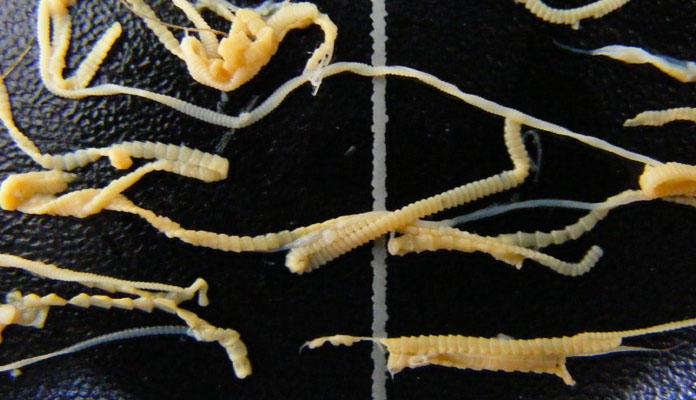
Tapeworms are typical for birds that come in close contact with the ground and soil. They have an indirect lifecycle, requiring an intermediate host like a slug, snail, bug, or earthworm to spread. Several species of tapeworms can infect chickens.
7. Eye worm (Oxyspirura mansoni)
Eyeworms are tiny white tropical roundworms that settle in the corner of a chicken’s eye in the tear ducts or third eyelid. They cause eye inflammation and excessive tearing. Chickens scratch their eyes and rub their feathers.
The Surinam cockroach spreads the eggs as an intermediate host. It’s found around the world in tropical and subtropical areas. In the US, it’s common in the region from North Carolina to Texas.
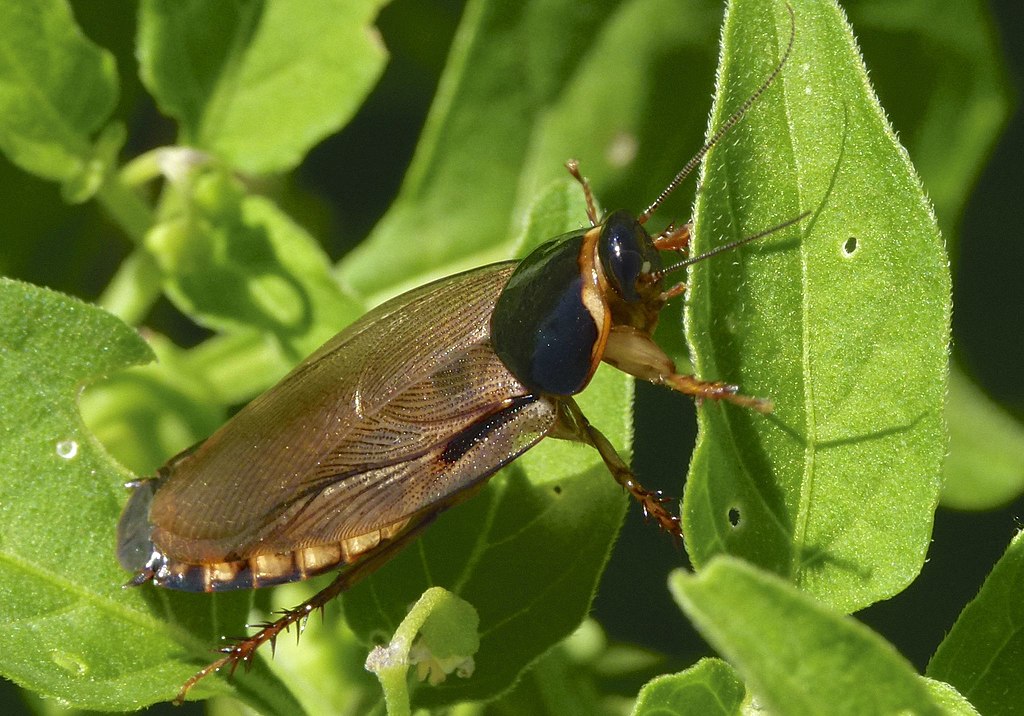
Although the worms are tiny, they can be seen with the naked eye and look like slender thread-like worms. Tropical worms used to be rare and situated in warm, tropical areas, but they are becoming more common.
Spotting the Symptoms: How to Tell if Your Chickens Have Worms
In the case of heavy infestations, you can see large roundworms and tapeworms in the chicken droppings with the naked eye.
However, oftentimes, it’s not that clear from looking at the droppings. Veterinarians use a fecal sample of the bird’s droppings to diagnose correctly. The eggs and worms are clearly visible when examining a fecal smear under the microscope.
To identify a possible worm infestation in your flock, here are clinical signs to put you in the right direction:
| Worm Type | Symptoms | Diagnosis |
|---|---|---|
| Roundworms | diarrhea poor condition lethargy death worms in eggs | fecal examination of the droppings reveals the worms and the eggs |
| Capillary worms | anorexia and weight loss difficult swallowing diarrhea | fecal examination reveals the eggs |
| Gapeworms | yawning, gagging, gasping for air stretching the neck shaking the head | usually based on the gaping post mortem examination shows worms in the trachea |
| Gizzard worms | weight loss general depression slow growth death | fecal examination to find the worm eggs (with a double wall) or via necropsy |
| Tapeworms | usually, there are no clinical signs, but the tapeworm feeds on essential nutrients and can cause weight loss diarrhea | fecal examination to find tapeworm embryos (with six hooks) |
| Cecal Worms | usually, no clinical signs, but the worm can carry Histomonas, causing Blackhead disease chickens with blackhead disease suffer from weight loss, thirst, yellow diarrhea, blood in the droppings, death | fecal examination to find Heterakis eggs in droppings |
| Eye worms | face rubbing eye scratching inflammation of the eye swollen eyelids excessive tearing foamy, bubbly eyes | visual inspection reveals the tiny, slender, thread-like worms |
In general, intestinal worms in chickens come with the following symptoms:
- diarrhea
- worms in the droppings
- weight loss and anorexia
- general depression
- feather loss
- slow growth
- slowdown in egg-laying
- worms in eggs
- death
Chickens affected by gapeworms open their mouth, stretch their neck, shake their head, and gasp for air.
Chickens with eyeworms scratch their face, rub their eyes, and have swollen eyelids and foamy eyes due to excessive tearing. Sometimes, there is nasal discharge. Oftentimes, eyeworms are misdiagnosed as respiratory diseases such as Chronic Respiratory Disease or Coryza.
Worms Be Gone: How to Deworm Chickens and Treat Worm Infestations
Several natural and medicinal dewormers are effective against internal parasites. Anthelmintic drugs are far more effective in treating worms than natural remedies, although natural remedies can certainly help.
Ivermectin is probably the most common and well-known dewormer. It’s a broad-spectrum antiparasitic drug that can treat most chicken worms and parasites. Many veterinarians use it since it’s so effective, although it’s not officially approved for use in poultry. All it takes is a couple of drops on the back of the neck. The only drawback is that it’s not effective against tapeworms. For full details and instructions, we have a full article on using Ivermectin for chickens.
- Ivermectin: Pour on 0.2mg-0.4mg/kg of bodyweight (at maximum of 0.5mg/kg). Spread the feathers on the neck and apply the drops immediately on the skin of the chicken. Repeat after 7-10 days to kill larvae that hatched in the meantime. For full instructions on Ivermectin, check our guide on Ivermectin.
- Safe-guard: Add 1 mg/kg fenbendazole in drinking water for the subsequent 5 days. Repeat the treatment after 7 days.
If you want to follow official guidelines, the United States Food and Drug Administration (FDA) approved piperazine for treating roundworms and cecal worms in poultry. To treat tapeworms, you can administer albendazole.
| Dewormer | Effective Against | Description |
|---|---|---|
| Ivermectin (off-label) | Roundworms Cecal worms Gapeworms Capillary worms Threadworms Eye worms Mites Lice | 2 x 0.4 mg/kg pour on – 10 days apart The egg withdrawal period is 7 days. The meat withdrawal period is 10 days. Check our guide on Ivermectin for chickens of Dr. E. Riviera, DVM, on how to safely apply Ivermectin for chickens. For eye worms, manually remove the worm and dilute Ivermectin topically. |
| Piperazine | Roundworms Cecal worms | This can be given orally (50-100 mg/bird) or 1 ml/kg of water; repeat the same dose after 7-10 days for better results. There is no egg withdrawal period required for this drug. |
| Fenbendazole off-label | Roundworms Cecal worms Tapeworms | Add 1 mg/kg in drinking water for the subsequent 5 days. Repeat the treatment after 7 days. All-round, broad-spectrum, but not effective against hairworms There is no withdrawal period for the eggs. |
| Mebendazole | Gizzard worms | 10 mg/kg for 3 days There is no withdrawal period for the eggs. |
| Tetramisole | Gapeworm | 3.6 mg/kg drinking water for 3 days The withdrawal period is almost 10 days. |
| Pyrantel tartrate | Capillary worms Roundworms | 15–25 mg/kg in the drinking water helps to get rid of A galli and Capillaria spp. No withdrawal time is required for the consumption of eggs. |
| Albendazole off-label | Tapeworms Roundworms | 20 mg/kg in drinking water; repeat the treatment after 10 days. The withdrawal period in eggs is 2-3 days. |
These dewormers help you control and treat your chicken’s worm infestation. Some anthelmintic agents have no egg withdrawal periods and allow you to consume the eggs safely.
Follow the instructions and safety level before administering any anthelmintic medicines to your birds. Always consult with your veterinarian to choose the right dewormer for your chicken.
Besides chemical dewormers, poultry farmers prefer using natural anthelmintic agents, such as ginger, pumpkin seeds, Diatomaceous Earth supplement (2% in feed), etc.
Natural Dewormers: Herbs and Spices Proven to Control Parasites in Chickens
Several natural dewormers exist that can go a long way in helping to control and prevent worm infestations in your flock. These are safe and effective alternatives that can easily be integrated into your daily routines.
- Apple Cider Vinegar: add 1 or 2 tablespoons per gallon of water
- Pumpkin Seeds: Add 2% of pumpkin seeds to the chicken’s diet or 2 g/bird per day.
Here is a list of natural dewormers that can help to keep your chickens parasite-free:
- Apple Cider Vinegar: apple cider vinegar in your bird’s water helps to reduce worm load in your chicken and acts as a mild antiseptic and antibiotic. It creates an alkaline environment in the guts, making it very uninviting for worms to settle down.
- Pumpkin seeds: pumpkin seeds contain cucurbitacin, an amino acid that acts as a deworming agent. In chickens, pumpkin seeds help eliminate tapeworms and other intestinal worms by killing them in the digestive tract. The anthelmintic effect has been known for a long time, as Native American tribes used pumpkin seeds to get rid of internal worms. Several studies have now confirmed the same effect in chickens. [ACC, AHK, ACH]
- Diatomaceous Earth: adding DE as a supplement to the chicken’s feed helps to control the large roundworm load in the chicken’s guts (Ascaridia galli). As there is so much discussion on this topic among poultry keepers, we’ll discuss this a little bit more in detail below.
- Spicy food: spicy food, like chili peppers, cayenne, tabasco, jalapenos, and habaneros, can help prevent worms. Spicy food creates a healthy bacterial environment that discourages worms from nestling in the guts. Worms are not bothered by the hot capsaicin in peppers, so it’s not a dewormer like anthelmintic medicines. For more details, check our in-depth article on spicy food for chickens.
- Garlic: garlic is well-known for its medicinal properties and is used to treat several internal parasites. It makes the chicken’s digestive system a less attractive place for worms to settle. Adding a small piece of freshly crushed garlic to the drinking water significantly reduces the worm load in the guts. Avoid using commercially processed garlic powder, and never give your chickens garlic too often or too much.
- Ginger: ginger stimulates blood circulation and the digestive system. It helps the body to kill parasites in the stomach before they get into the guts. It’s great for prevention, but once the worms are in the intestines, ginger won’t help any longer.
- Cucumber Seeds: a few scientific resources mention the effectiveness of cucumber seed extracts in controlling tapeworms.
Most of these natural remedies can help to prevent worms by creating an environment in the guts that’s very unwelcoming for parasites. Several over-the-counter natural remedies also do a good job to keep the worms at bay.
Repeat any procedures after 14 days, as subsequent doses prevent newly hatched worms from swarming.
That said, if you need to treat an ongoing infestation, drugs like Ivermectin are far more effective in eliminating worms.
Can Diatomaceous Earth (DE) be used as a Dewormer?
Diatomaceous earth is an off-white powder consisting of tiny sharp shells and is often used as a natural dewormer. Since 2021, there has been ample scientific evidence to assume that adding 2% DE to the chicken’s diet reduces the number of large roundworms (A. galli) in a chicken’s gut.
Diatomaceous earth (DE) is an off-white powder that is produced by crushing siliceous rocks. It consists of fossilized algae found in the ocean and soil. They account for roughly half of the organic material in the oceans on our planet. The crushed powder contains tiny sharp shells, which people use to treat mites and external parasites.
The use of diatomaceous earth as a dewormer for chickens has long been debated. It has always been clear that DE effectively treats external ectoparasites. Many people automatically assumed the tiny, sharp shells would also kill or dehydrate internal parasites. Gail Damerow describes in the Chicken Encyclopedia that the chicken’s saliva probably softens the cutting edges of DE, suggesting it won’t be effective.
One study in 2019 concluded that dietary supplementation with DE significantly reduced the number of roundworms (A. galli) present in the chicken’s intestines. Their studies seem to contradict the earlier work of Velamazon (2015), which did not find any significant reductions, but that studies used lower DE concentrations (1.35%).
Another study published in 2021 in the European Journal of Agriculture and Food Sciences concluded that dietary supplementation of DE significantly reduced the number of roundworm eggs (Ascaridia galli) in fecal analysis.
Prevention & Control of Worms
Worms and eggs are always around at some level in the soil and the chicken coop.
Unfortunately, it’s next to impossible to keep them out of the environment, but there are several things you can do to prevent a worm infestation:
- Deworming Routine: regular deworming prevents worm growth in the chicken’s guts; this can be done with anti-parasitic drugs like Ivermectin, fenbendazole, and others
- Clean Environment: regularly clean the coop and remove the droppings to reduce exposure to worm eggs, daily clean the feeders and waterers and keep the bedding dry
- Natural Dewormers: adding apple cider vinegar to the drinking water helps to reduce worm load in chickens. Spicy chicken feed supplements are also known as dewormers. And garlic extract is also a food supplement known as a natural dewormer, a booster for the immune system, and an active red mite repellent.
- Avoid Overcrowding: provide enough space for the chickens to move freely and avoid contact with infected birds; use our chicken coop and run calculator to calculate minimal space requirements
- Proper Nutrition: a well-balanced diet boosts the chicken’s immune system and makes them less susceptible to worms
- Practice Biosecurity: practice good biosecurity rules to prevent contamination of feed, water, and environment
- Moving the Coop: changing the chicken coop and run prevents the buildup of worm eggs in the soil
- Soil Management: prevent contact with the soil; use a proper feeder rather than throwing feed on the ground to feed your chickens; avoid wet, muddy, and warm areas in the run, as they are the perfect breeding ground for worm eggs
A clean environment, a deworming routine, and proper nutrition will get you a long way.
Related Questions
Eating eggs from chickens that suffer from worm infestations is not recommended. Chickens poop through the same hole as they lay their eggs. In rare cases, the worms can get from the intestines to the oviduct and get into the eggs. Always clean, inspect, and cook eggs from wormy chickens.
Most poultry worms are species-specific, and there is little chance for us to get infected by eating eggs. However, humans can potentially get worms when consuming raw or undercooked eggs. This is very rare with commercial eggs, as they all pass through safety inspections.
Chickens can be dewormed when they are 4 weeks old, but it’s recommended to wait until they are at least 6 weeks old. Deworming medication can be very harsh on the chick’s developing digestive system. Adjust the dose if you are deworming chickens before the age of 6 weeks.
It’s extremely unlikely to catch worms from chickens. Poultry worms are species-specific and can generally not survive in the human body. Furthermore, worms only spread through close contact with feces or by eating intermediate hosts like earthworms.
Pumpkin seeds contain an amino acid called cucurbitacin, which acts as a deworming agent. In chicken, pumpkin seeds help eliminate tapeworms and other intestinal worms by killing them in the digestive tract.
Recent studies on the anthelmintic effect of oregano indicate that oregano can help control poultry worms. Oregano prevents the larvae of roundworms (A. galli) from fully developing. Some studies describe the herb as effective as albendazole in inhibiting the development of worm eggs.
No, Corid is only used to treat coccidiosis. If you need to deworm your chickens when they are on Corid / Amprolium, you can use deworming agents like Safe-Guard (fenbendazole) or Valbazen (Albendazole).
Many large roundworms are visible to the naked eye in chicken poop as they grow up to 3-4 inches. However, not all worms are visible in chicken poop; some worms and eggs can only be found during fecal examination under a microscope.
Worms in chickens are very common. There is always a certain level of worms and eggs in the soil, making it almost impossible to eliminate them entirely. Regular deworming and a clean environment can keep the worms at bay.
Yes, in rare cases, the intestinal worms of a chicken can get into the oviduct where the eggs are formed, and the worm can get stuck inside the egg. This is possible because chickens poop through the same hole as they lay their eggs. While rare, this even happens occasionally in commercial eggs.
VetRx is used to treat eye worm infections in chickens, as well as colds and scaly leg mites. It can not be used to treat other poultry worms, such as roundworms, tapeworms, cecal worms, or gizzard worms.
Carrots can not be used to deworm chickens. Some people give their dogs carrots in the belief that the raw pieces scrape the intestines and remove worms and internal parasites. Chickens have a gizzard, a muscular stomach that grinds the raw carrot, and a proventriculus to digest it chemically.

Dr. S. A. Roky is a licensed veterinarian and an academic researcher with a vast experience with poultry. He runs a veterinary clinic and has a huge clinical knowledge of poultry diseases, symptoms, signs, and treatment.
